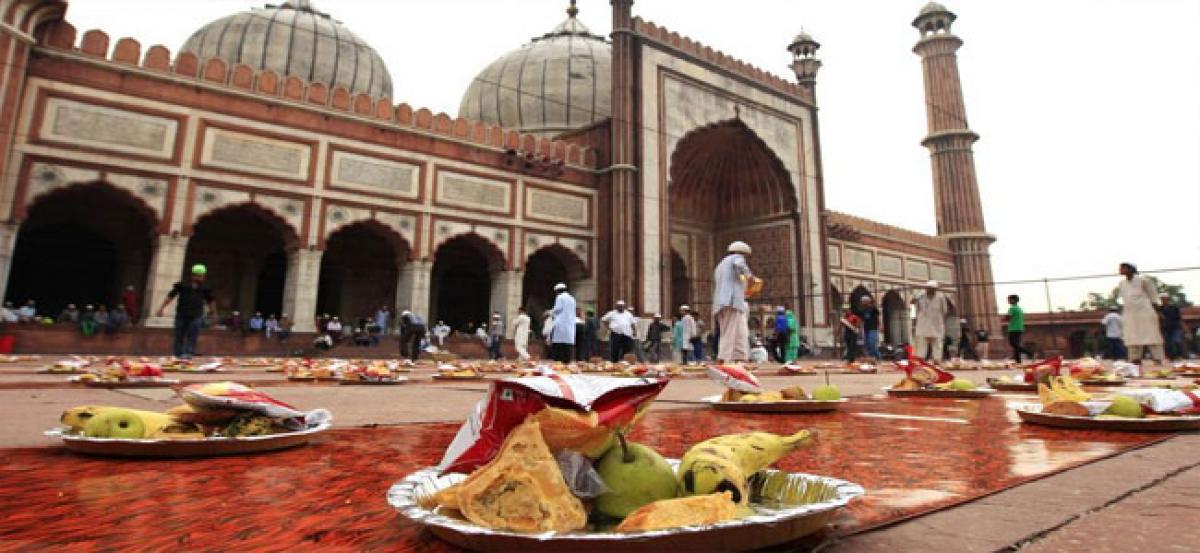Live
- Over 7,600 Syrians return from Turkiye in five days after Assad's downfall: minister
- Delhi BJP leaders stay overnight in 1,194 slum clusters
- Keerthy Suresh and Anthony Thattil Tie the Knot in a Christian Ceremony
- AAP, BJP making false promises to slum dwellers for votes: Delhi Congress
- 'Vere Level Office' Review: A Refreshing Take on Corporate Life with Humor and Heart
- Libya's oil company declares force majeure at key refinery following clashes
- Illegal Rohingyas: BJP seeks Assembly session to implement NRC in Delhi
- Philippines orders full evacuation amid possible volcanic re-eruption
- Government Prioritizes Welfare of the Poor, says Dola Sri Bala Veeranjaneyaswamy
- Two Russian oil tankers with 29 on board damaged due to bad weather
Just In

If you are observing a fast during the holy month of Ramzan, it is essential to start your day with a nutritious and satiating meal, so that you can beat hunger pangs for the rest of the day. Nutritionist Umang Agarwal, founder and CEO, Umang World, has some suggestions:
Ramzan diet: If you are observing a fast during the holy month, here’s what experts recommend you should eat during sehri and iftaar to stay healthy. We also tell you how to stay away from ailments triggered by fasting.
If you are observing a fast during the holy month of Ramzan, it is essential to start your day with a nutritious and satiating meal, so that you can beat hunger pangs for the rest of the day. Nutritionist Umang Agarwal, founder and CEO, Umang World, has some suggestions:
Sehri (early morning):
* Never skip the early morning meal that is Suhoor/Sehri as that is the fundamental meal your body depends on for the rest of the day.
* Start your day with some nuts soaked overnight, followed by juice or milk along with fruits.
* To ensure that you feel full for the rest of the day, opt for high-fibre foods such as multigrain breads with paneer/ chicken/ eggs along with vegetables.
* Oats or multigrain atta, stuffed parantha with paneer or egg bhurji cooked on a non-stick pan will keep your body satiated for the day.
Iftaar (dinner time):
* In the evening, break your fast with a glass of lemon water with sugar and salt to provide your body with much-needed hydration.
* Dates are customary and important as they are a high source of energy and rich in vital nutrients.
* People who are diabetic can avoid dates and those who are lactose intolerant can opt for soya milk instead of regular milk.
* After a little gap, eat a proper meal that includes brown rice or high-fibre roti with a vegetable salad, plus lean meat or fish or eggs.
Fasting can trigger certain health issues. Deepak Parashar, Medical Officer, Healthians, lists the drawbacks:
* Diabetes: A diabetic observing Ramzan fast has a high risk of fluctuations in glucose levels. Untimely meals and improper intake of medication can cause blood sugar levels to drop significantly and cause hypoglycaemia that leads to weakness and fainting.
* Hypertension: People suffering from high blood pressure have to take medicines timely, as skipping can cause serious repercussions. Fasting during Ramzan, due to its strict rules, does not allow intake of medicine or water during fasting hours. Such changes in blood pressure can do a lot of harm.
* Thyroid: For someone who is on a regular course of thyroid medication, improper or untimely intake of medication can cause hormonal imbalance in the body. Do not skip your medicines.
* Dehydration: Fasting for long hours without any food or water during hot weather can cause a few health complications like dehydration, which can cause weakness, lethargy, and headache.
* Stomach problems: Long hours on an empty stomach can cause discomfort and gastric problems like bloating, ache and gas. Do not skip your share of ‘sehri’ to avoid any stomach woes.
* Cholesterol: The food consumed during fasting is usually loaded with fat and deep-fried. It can lead to an increase in cholesterol levels for someone already suffering from cholesterol and heart problems.
* Weakness: Not everyone can afford to stay on an empty stomach for long hours. Long hours’ deficit of food and water can also cause weakness.

© 2024 Hyderabad Media House Limited/The Hans India. All rights reserved. Powered by hocalwire.com







